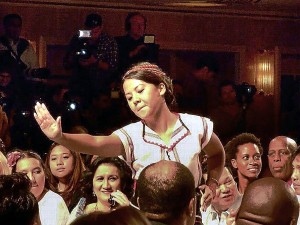Narda gains foothold in Manhattan market

NARDA CAPUYAN’s woven Igorot fabrics were turned into haute couture in the 2012 New York Fashion Week—the first time many high-end New Yorkers were introduced to the Cordillera culture. PHOTO COURTESY OF NARDA CAPUYAN
BAGUIO CITY – The Cordillera brand Narda’s was displayed at a recent New York fashion week and provided Cordillera weaver Leonarda Capuyan a new opportunity to reclaim a foothold in the Manhattan market.
Her fabrics made up the collection modeled on the runway of the Couture Fashion Week New York at the Waldorf Astoria, after being selected as one of the Philippine representatives to the annual fashion event.
Capuyan says she is in the middle of exploratory talks with five fashion designers who intend to develop a high-end line of garments using woven Cordillera fabrics.
She developed a following in the ’70s when she and her crew of community women started weaving tie-dyed threads and recycled acrylic yarn into blankets and bed covers, using the traditional backstrap weaving skills of the Mt. Province.
Her woven fabrics were once sold as household decor or were wrapped around furniture in New York’s Bloomingdale’s store in the late ’80s and ’90s, but the transactions were cut because of the Asian currency crisis in 1997.
Early this year, Capuyan’s fabrics were chosen by Couture Fashion Week founder and producer Andres Aquino, a Colombian-born American designer, for this year’s fashion week, prompting the weaver to consider reworking her choice of colors.
Capuyan’s signature fabrics combine solid hues of earth colors like red or brown. She says a New York audience “challenged me into trying out a new pattern without sacrificing the signature Narda’s designs.”
She ended up muting her earth tones and mixing her favored colors with purple and gray-toned yarn, which Aquino and Filipino designer Barge Ramos turned into men’s shirts, gowns, jackets and business suits.
“It was the first time New York was introduced formally to Cordillera fabrics,” Capuyan says.
Approached by New York retailers, Capuyan says she told them the fabrics depicted the Cordillera culture, pointing out an image of the Ifugao rice terraces on a purple Cordillera ikat (tie-dyed) shirt.
“This was like tapestry,” she says.
She still uses the traditional backstrap but the opportunities opened by the New York event now allows her “to play with my work.”
“This time, I am making art. My fabrics are simpler but when you look at it from afar, you see the layers for which Narda’s is known,” she says.
The Narda’s website states Capuyan started the Narda’s Handwoven Arts and Crafts in 1970 in La Trinidad, Benguet, weaving blankets from recycled acrylic yarns.
Capuyan is a nurse by training “whose hand-knitting hobby attracted the mothers [of her community].” The website adds Capuyan’s hobby encouraged them to weave to keep them busy.
“From blankets, Narda’s went into hotel furnishings, supplying the Manila Hotel and other five-star hotels in the country. Narda revived the Cordillera ikat tradition designing and dying threads in vibrant colors to suit contemporary taste. Ikat is a very old tradition of tying and dyeing segments of threads before actual weaving. Narda’s new style of ikat in place mats, shawls and bags became a hit to foreign buyers,” the website states.
It adds Capuyan’s big break was Bloomingdale’s when she began supplying the Manhattan store with her products in 1982, after she was featured there in an all-Filipino sales exhibition.
That same year, Capuyan received the Golden Shell Award from the then Ministry of Trade for her role in sustaining the dying weaving trade.
Her story was used in a television commercial commissioned by the Development Bank of the Philippines to drumbeat entrepreneurship, and Capuyan was soon hobnobbing with Philippine presidents, like the late Corazon Aquino who presented her with the Countryside Investor Award in 1989.
“Narda’s provided jobs to over 600 Cordillera women weavers, until the earthquake hit Baguio in 1990. Narda’s spearheaded ‘Baguio Isubli Tayo’ (Let us rebuild Baguio) along with other Baguio producers by having earthquake sales in Manila to help generate jobs in Baguio,” it says.
Capuyan adds Narda’s remains a small enterprise, “and I intend to keep it that way.”
Unlike her Bloomingdale’s account, which required her to ship out volumes of blankets and other products, she believes her new transactions with American designers may be “less stressful.”
“They will expect me to produce one-of-a-kind fabrics so I don’t need to make so many copies. This will give me time to be an artist,” she smiles.